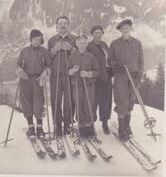
Jews scrubbing the streets of Vienna in May 1938 before the war
________________________________________________________________________________
My uncle Paul, who grew up as a teenager in Austria in the 1930’s, used to tell me about how he was beaten up every day in school simply because he was Jewish. My mother who was younger just wanted to fit in, and remembered wanting to join the Nazi youth because that is what all of the kids were doing. When my grandfather was forced to sell the family business, a clothing department store, my grandmother said to him ‘let’s just pack up the car and leave’, however, my grandfather refused. He told her “I fought for the Kaiser in WWI, and we are Austrian too.” It was not until he was taken away to Dachau on Kristallnacht that he finally realized how dire things were and that they had to flee for their lives. When his non-Jewish comrade from the army helped get him out through his connections, he finally realized they had to flee. People often wonder, didn’t people in Germany and Austria see the handwriting on the wall? Didn’t they realize that German and Austrian Jewish life had been stripped away? How do we understand that they seemed to tolerate it when things got worse and worse?
Nahmanides in his masterful commentary on the Torah sets down a principle that the Torah is a blueprint of future Jewish history. The events in the Torah do not just teach us about history, but it is also a template through which future events in the unfolding of the saga of the Jewish people are reproduced. In this week’s Torah reading in the beginning of the Book of Exodus we see that the beginning of Jewish history was a cycle of great prosperity and leadership, with Joseph being the viceroy of Egypt. However this secure environment quickly changes into a cycle of persecution. A ‘new king’ arises, a new regime and things start to turn bad. Pharaoh implements a gradual program of oppression. First we are told that they appointed tax collectors in order to cause them to suffer (Exodus 1:11). Seforno explains that the Egyptians imposed a public works conscription program in which the Jews at first willingly participated. Then the Egyptians oppressed the Jews and enslaved them against their will (ibid v. 13). Then they embittered their lives with even more difficult work. (ibid. v. 14). Pharaoh eventually began a program of genocide by ordering the male babies to be thrown into the river. So we see that Pharaoh gradually worsened the forced labor, so that the Jews, and perhaps the Egyptians as well, would come to accept each step which was more severe, something they might not have done had it been introduced from the beginning. Human nature is such that people learn to accept and accommodate themselves to circumstances and also to behaviors when they increase gradually over time. This process is known in psychology as desensitization, and was developed by Mary Cover Jones as a way to get people to overcome their phobias.
We see that like Pharaoh, Hitler did not just start killing Jews, he used the process of desensitization by gradually worsening the persecution. In her book “Jewish Women in Nazi Germany: Daily Life, Daily Struggles, 1933-1939”, author Marion Kaplan documents the gradual alienation, stigmatization and eventual persecution of German Jews in the 1930’s. What is fascinating about the book is that we see how the Jews of Germany gradually accommodated themselves and then came to accept degrees of persecution which would have seemed shocking and unacceptable at the beginning. The Zohar tells us that Pharaoh is the symbol of the Yetzer Hara, the negative voice within us which allows our pejorative behaviors, habits and sometimes addictions to enslave us. How does the negativity accomplish this? With a gradual program, inuring us to behaviors which at first seem unacceptable. But the book of Exodus tells us that we are not to despair, for over the coming weeks we will see that with trust in the Almighty, we can free ourselves from even the worst oppression, whether it occurs on a political level from the outside, or a personal level within.

My mother, uncles and grandparents in Salzburg, Austria before the war


Comments